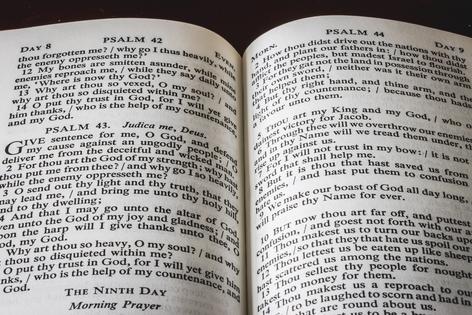The God Squad: More short Psalms for summer Bible study: Psalm 43
1 Judge me, O God, and plead my cause against an ungodly nation: O deliver me from the deceitful and unjust man.
2 For thou art the God of my strength: why dost thou cast me off? why go I mourning because of the oppression of the enemy?
3 O send out thy light and thy truth: let them lead me; let them bring me unto thy holy hill, and to thy tabernacles.
4 Then will I go unto the altar of God, unto God my exceeding joy: yea, upon the harp will I praise thee, O God my God.
5 Why art thou cast down, O my soul? and why art thou disquieted within me? hope in God: for I shall yet praise him, who is the health of my countenance, and my God. (KJV)
Psalm 43 is deep, brooding, hopeful and odd. First off, Psalm 43 is almost the same as Psalm 42 with some verses exactly the same (versus 3 and 5). It is possible that once they were a single Psalm, but, for some reason, they were ultimately divided. Who knows? All this is above my pay grade.
Also, Psalm 43 strangely does not include a superscription which would attribute its authorship, like the common phrase, “A Hymn for David.” I am assuming it was written by David running away from a jealous King Saul, but perhaps it was composed by a harp player who had been exiled from the Temple in Jerusalem. The main point is that this psalm could have been written by anyone who has felt betrayed or unjustly attacked; or by someone who is just depressed over the bumps and bruises of life. That is why I love it so. This psalm is honest about being blue.
The psalmist has brought his brokenness before God, and with it a subtle but powerful argument: God is my strength but I am weak. Therefore, God must either be weak or, worse, indifferent to my pain, “For thou art the God of my strength: why dost thou cast me off? why go I mourning because of the oppression of the enemy? (v.2)” For Christian readers, this verse perfectly presages the cry of Jesus in his last moments on the cross, “And about the ninth hour Jesus cried with a loud voice, saying, Eli, Eli, lama sabachthani? that is to say, My God, my God, why hast thou forsaken me?” (Matt 25:46). The setting is different for this psalm, but the words and the sentiments and the question are the same. Pain makes us doubt God.
Paradoxically, suffering is both the most fundamental obstacle to faith while also being the most fundamental reason for faith.
We think that we are innocent, and therefore we think that our sufferings are a betrayal by a supposedly just God. This is wrong on two counts. Most of our suffering is caused by our own actions. We damage our health, we violate our vows, we transgress clear moral rules and therefore we suffer the just consequences of our sins. This is a harsh truth but it is a real truth and when God is used as the scapegoat for our own moral lassitude I am, to use the language of the KJV, sorely vexed.
However, the world does produce a surfeit of suffering of totally innocent people and God must answer for this. God’s response is that not all suffering is punishment. Some is the result of bad luck or bad genes or bad times. The ancient rabbis taught that, “The world goes along according to its own laws.” Aristotle called this natural evil as opposed to moral evil. If you are in the path of a hurricane, you may suffer, but the hurricane is not evil, and its destruction is not a punishment from God.
God’s offer in the face of unjust suffering is to accompany us through the suffering and give us strength to emerge on the other side of despair and grief healed and hopeful again. Like the force of buoyancy that pushes a cork up to the surface after being pushed down by a wave, God offers us spiritual buoyancy to push us up to light and truth (v.3).
The psalm concludes in verse 5, “Why art thou cast down, O my soul? and why art thou disquieted within me? hope in God: for I shall yet praise him, who is the health of my countenance, and my God.” The Hebrew yeshuat panai, which KJV translates as “the health of my countenance” literally means “the salvation of my face” but it is impossible to adequately translate. Its meaning must be discovered. It means that at some point when you are utterly lost, God will send you someone who will find you.
Study this:
Who has found you?
(Send ALL QUESTIONS AND COMMENTS to The God Squad via email at godsquadquestion@aol.com. Rabbi Gellman is the author of several books, including “Religion for Dummies,” co-written with Fr. Tom Hartman.)
©2021 The God Squad. Distributed by Tribune Content Agency, LLC.
(c) 2021 THE GOD SQUAD DISTRIBUTED BY TRIBUNE MEDIA SERVICES, INC.










